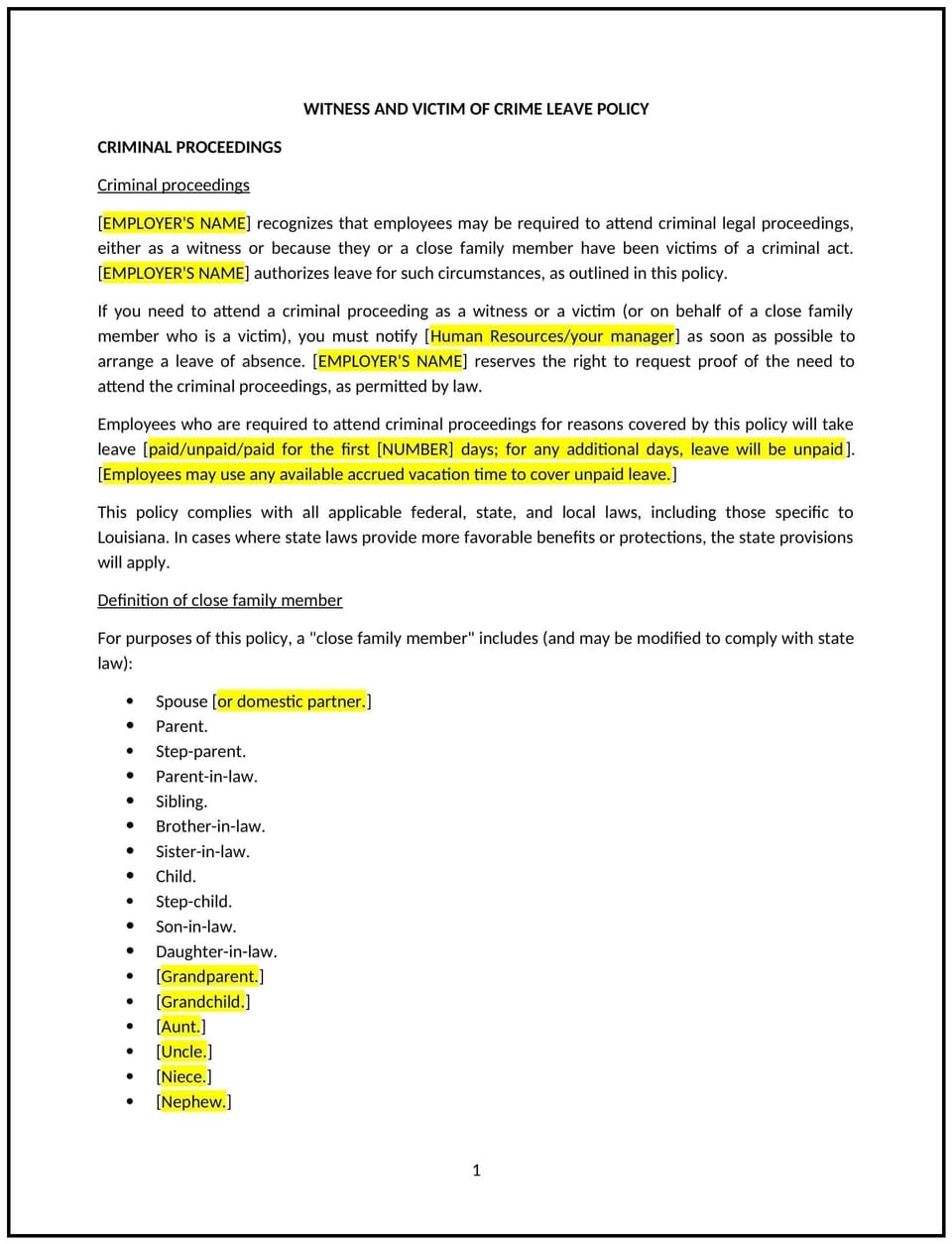Witness and victim of crime leave policy (Louisiana): Free template

Witness and victim of crime leave policy (Louisiana)
This witness and victim of crime leave policy is designed to help Louisiana businesses provide clear guidelines for employees needing time off to participate in legal proceedings as a witness or victim of a crime. It outlines eligibility, procedures, and expectations to support employees while maintaining workplace operations.
By implementing this policy, businesses can demonstrate their commitment to supporting employees during challenging times.
How to use this witness and victim of crime leave policy (Louisiana)
- Define eligibility: Specify which employees qualify for leave under this policy, such as full-time, part-time, or temporary staff.
- Outline covered scenarios: Include participation as a witness, victim, or close family member of a victim in legal proceedings, including court hearings or depositions.
- Provide request procedures: Detail how employees should notify the company, including advance notice and required documentation, such as subpoenas or court notices.
- Address leave duration: Clarify how much leave time is allowed and whether extensions are available for prolonged legal proceedings.
- Include pay and benefits: Specify whether the leave is paid or unpaid and how benefits, such as health insurance, will be maintained.
- Communicate return-to-work procedures: Explain how employees should notify the company of their intent to return to work after completing their leave.
Benefits of using a witness and victim of crime leave policy (Louisiana)
Implementing this policy provides several advantages for Louisiana businesses:
- Supports employees: Demonstrates empathy and understanding for employees participating in legal proceedings.
- Reduces stress: Provides a structured approach for employees to manage their legal obligations.
- Promotes transparency: Establishes clear guidelines for requesting and managing leave related to legal matters.
- Enhances morale: Builds trust and loyalty by showing support for employees during difficult times.
- Reflects Louisiana-specific considerations: Adapts to regional legal practices and cultural expectations.
Tips for using this witness and victim of crime leave policy (Louisiana)
- Communicate clearly: Ensure employees understand their rights and responsibilities under the policy.
- Maintain confidentiality: Handle leave requests and related information discreetly to respect employee privacy.
- Monitor workloads: Develop strategies to manage workloads during employee absences, such as temporary reassignments.
- Provide support: Offer resources such as counseling or employee assistance programs (EAPs) to employees who may need additional help.
- Update regularly: Revise the policy to reflect changes in workplace practices or Louisiana-specific legal requirements.
Q: Who is eligible for leave under this policy?
A: Eligibility typically extends to all employees, including full-time, part-time, and temporary workers, as outlined in the policy.
Q: What types of legal proceedings are covered?
A: Covered proceedings include serving as a witness, being a victim of a crime, or supporting a close family member who is a victim in court appearances, depositions, or similar events.
Q: How should employees request leave under this policy?
A: Employees should submit a written request to their manager or HR, providing advance notice and supporting documentation, such as subpoenas or court notices.
Q: Is leave under this policy paid or unpaid?
A: Whether the leave is paid or unpaid depends on the company’s specific policy, which should be outlined in detail.
Q: What documentation is required for leave approval?
A: Employees must provide official documentation, such as a subpoena, court summons, or letter from law enforcement, to support their request.
Q: What happens if legal proceedings require extended leave?
A: Employees may request an extension by providing updated documentation, subject to company approval and operational needs.
Q: How often should this policy be reviewed?
A: The policy should be reviewed annually or when changes occur in workplace practices or Louisiana-specific requirements.
This article contains general legal information and does not contain legal advice. Cobrief is not a law firm or a substitute for an attorney or law firm. The law is complex and changes often. For legal advice, please ask a lawyer.


